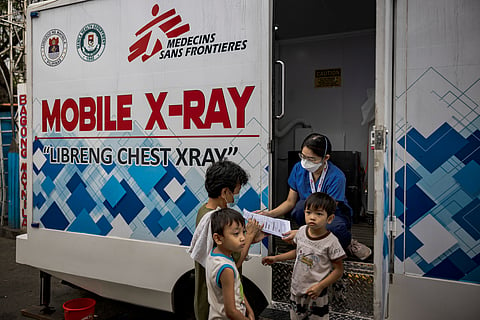
- NEWS
- the EDIT
- COMMENTARY
- BUSINESS
- LIFE
- SHOW
- ACTION
- GLOBAL GOALS
- SNAPS
- DYARYO TIRADA
- MORE

Doctors Without Borders/Médecins Sans Frontières (MSF) is supporting Manila Health Department (MHD) in implementing the new national treatment guidelines on less severe tuberculosis (TB) for children by conducting a two-day workshop for physicians and TB nurses from 15 health centers in Tondo Districts 1 and 2.
The training focused on chest X-ray interpretation, screening and diagnosis of TB in children, disease severity classification and treatment.
The Department of Health adopted the four-month TB treatment for children as recommended by the World Health Organization (WHO). Previous studies have shown that this shorter regimen is as effective in eligible children as the previous treatment regimen, which lasted six months.
Within four months, a child can complete a course of treatment for TB and be considered cured.
Under the WHO guidelines, once people identified with TB are linked to care in the health center, the household contacts — including children — are investigated for TB. Children are also identified by health centers when they exhibit with symptoms of TB.
The new guidelines recommend the four-month treatment regimen 2HRZE/2HR for patients with non-severe drug-susceptible TB, aged three months to 16 years. This treatment regimen involves a two-month initial phase using four TB drugs, and a two-month maintenance phase, using two drugs.
The four-month regimen will be an improvement on many levels.
“For sure the shorter regimen will benefit the fight against TB in the City of Manila. Less time for the duration of treatment is equivalent to lesser logistics and commodities consumption, lesser disease burden for the family, and faster recovery from illness, especially in a depressed area like Tondo,” according to Dr. Richard H. Castro of the TB Prevention and Control Section of MHD.
For the child and their family, it means a better treatment experience: fewer health visits are needed, there are fewer days on treatment, less exposure to drugs and potentially less out-of-pocket expenses.
The implementation of the new TB treatment regimen is part of the MSF’s Test, Avoid, Cure TB in Children (Tactic) project, which includes documenting the current rollout and assessing feasibility and accessibility of the implementation of the new regimen in the Philippines and Uganda.
This study will identify possible barriers and solutions to encourage further deployment of the shorter regimens for children with non-severe drug susceptible TB globally.
According to Dr. Josephine G. Aldaba, research assistant professor I at the University of the Philippines-National Institute of Health, “Conducting this study in the Philippines is an important step in identifying possible barriers in its implementation, particularly its acceptability among the parents of children with TB and among the healthcare workers and its effectiveness. This four-month regimen can potentially improve adherence to TB treatment.”
Castro said, “Beyond providing the treatment itself, it’s also crucial to understand how the community accept and support this change. By working together and paying attention to how the community responds, we can make sure this treatment reaches every child and adolescent who needs it.”
